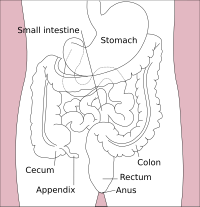
Photo from wikipedia
BACKGROUND The development of major low anterior resection syndrome (LARS) after low anterior resection is severely detrimental to quality of life, yet awareness of it by clinicians and patients and… Click to show full abstract
BACKGROUND The development of major low anterior resection syndrome (LARS) after low anterior resection is severely detrimental to quality of life, yet awareness of it by clinicians and patients and the frequency of treatment of LARS is unclear. STUDY DESIGN Patients who underwent low anterior resection for sigmoid or rectal cancer at a tertiary center between 2007 and 2017 (n = 798) were surveyed in 2019 to assess LARS symptoms and report medications or treatment received for LARS. LARS scores were calculated (score range 0-42) and normalized to published data on LARS prevalence in the general population in Europe, stratified by age (<50 or ≥50) and sex. RESULTS Of the 594 patients (74%) who returned the survey, 255 (43%) were identified as having major LARS (LARS score ≥30). This prevalence was significantly higher than published normative data from Denmark and Amsterdam when stratified by age greater than or less than 50 and sex. Patients with major LARS infrequently reported current use of first-line therapies (antidiarrheal medications 32%, fiber supplements 16%, and both 13%). Only 3% reported receiving second-line therapy of transanal irrigations and/or pelvic floor rehabilitation, and only 1% had undergone third-line therapy of sacral nerve stimulator implantation. CONCLUSION Major LARS is common yet seemingly underrecognized by clinicians because less than half of patients are on first-line therapy and practically none are on second- and third-line therapies. Long-term follow-up of patients after low anterior resection, improved preoperative and postoperative education, and continued symptom assessment is necessary to improve treatment of major LARS.
Journal Title: Journal of the American College of Surgeons
Year Published: 2022
Link to full text (if available)
Share on Social Media: Sign Up to like & get
recommendations!